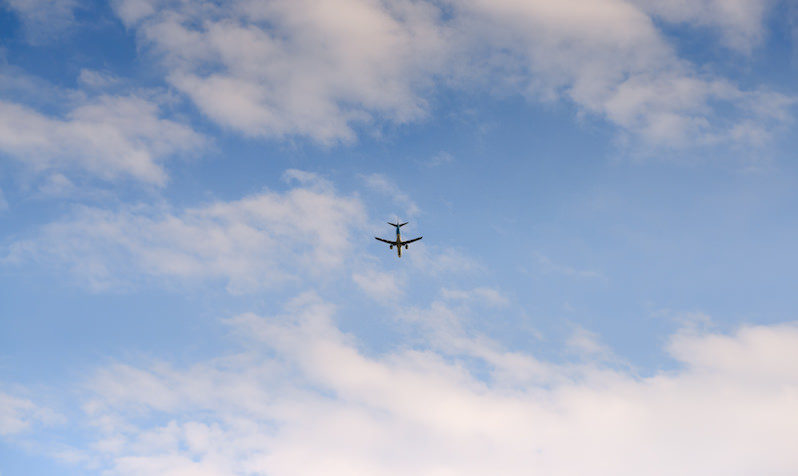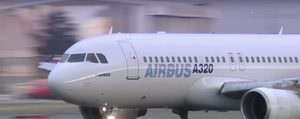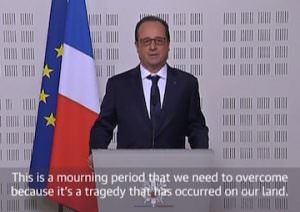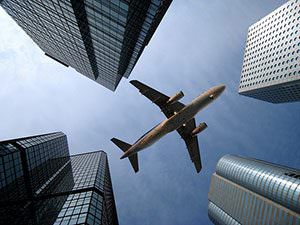Clean Aviation Will Take Wing, but ETA Is Up in the Air
With legendary inventor Elon Musk in the vanguard, innovators are racing to design an all-electric aircraft. One fact that spurs them on: Today's aviation-fuel airplanes are a significant part of the pollution crisis. Jerry Lin / Shutterstock
Jerry Lin / Shutterstock
Elon Musk is not the kind of eccentric billionaire who proposes strange ideas for the future and doesn’t deliver on them. He talked about creating reusable rockets for space travel, and he’s done that. He talked about making the Tesla a successful electric car brand, and the company started turning a profit in 2013. Then he said the cars would become self-driving, and that prospect is looking good. Musk has also talked about creating a “hyperloop” that will quickly transport people across long distances in tubes, another project that is in the works.
So when Musk starts talking about fully electric airplanes, you’d better believe he’s not just blowing smoke.
Musk cares about Tesla because electric cars are good for the environment, and he helped start SolarCity, a leading provider of residential solar devices and services. It makes sense that he wants to disrupt the airplane market to help the planet.
“Emissions from the aviation industry are significant,” Sally Benson, director of Stanford University’s Global Climate and Energy Project, told Truthdig. “In the U.S., aviation emissions are about 3 percent of the total.”
That may not seem like a lot, but commercial and private plane travel is expected to increase significantly in coming years, and emissions are likely to follow suit.
“Many developed countries are pursuing 60 to 80 percent reductions consistent with international climate protection goals,” Daniel Rutherford, a program director at the International Council on Clean Transportation, told Truthdig. Still, he added, civil aviation emissions are expected to “triple by midcentury.”
According to the Natural Resources Defense Council, airplanes emit more pollution than any other method of transportation. And in addition to releasing CO2, commercial airplanes have other harmful effects on the environment.
“Burning jet fuel also has other, harder-to-quantify climate impacts, notably warming due to emissions of nitrogen oxides … and aviation-induced cloudiness,” Rutherford said. “Aircrafts also contribute to local air quality problems in major urban areas and impact vulnerable communities through noise pollution.”
The development of a trustworthy commercial electric airplane isn’t the only magic bullet in the works for the aviation industry. Rutherford said many companies are focusing on biofuels. A 2014 NASA test showed that using biofuels would reduce soot emissions by half. Companies are also focusing on ways to reduce the weight of airplanes so that they burn less fuel.
Boeing has been contracted by NASA to research the creation of an aircraft called the SUGAR Volt, a hybrid electric airplane that would use jet fuel for takeoffs and switch to electric engines once in the air.
A Boeing representative told Truthdig that the technology has “potential to meet future performance and environmental goals for air vehicles in the 2030 to 2050 timeline,” explaining that the concept “allows long-range flights using conventional fuels and shorter-range flights using a substantial amount of electric power.”
Airbus is also designing a hybrid electric commercial airplane called the E-Thrust. Rather than a few large jet engines, the plane has many propellers, which distribute airflow evenly and increase efficiency. That concept could become a reality by 2050.
Although the two-man Solar Impulse team made headlines last year by flying thousands of miles in a relatively small solar-powered plane, it’s highly unlikely that solar energy will power a commercial plane anytime soon.
Possibly the biggest challenge for electric plane developers is creating batteries that hold enough energy. Research suggests that lithium batteries will soon be able to hold far more power than they do now, but it’s going to take time. Airplane fuel has 43 million joules of energy per kilogram, while current lithium-ion batteries typically have only around 1 million. Until battery technology makes it possible to power an airplane fully with electricity, it makes sense to focus on developing hybrid planes that use convention fuel in addition to electricity.
If electric airplanes eventually become the norm, it’s likely they will help slow climate change. It appears that industry innovators are banking on it. We just have to wait for someone like Elon Musk to shock us again by turning possibility into reality—hopefully soon.
Your support matters…Independent journalism is under threat and overshadowed by heavily funded mainstream media.
You can help level the playing field. Become a member.
Your tax-deductible contribution keeps us digging beneath the headlines to give you thought-provoking, investigative reporting and analysis that unearths what's really happening- without compromise.
Give today to support our courageous, independent journalists.





You need to be a supporter to comment.
There are currently no responses to this article.
Be the first to respond.